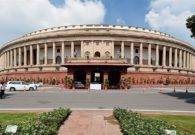UKIBC exclusive interview with James Crabtree on the 2019 Indian General Election

James Crabtree is Associate Professor of Practice at Lee Kuan Yew School of Public Policy, and Associate Fellow of Chatham Houses’ Asia-Pacific Programme. Formerly Mumbai Bureau Chief for the Financial Times, James has a wealth of first-hand insight on the political and economic scene unfolding in India. James recently came to speak to our members at a dedicated roundtable on his latest book ‘The Billionaire Raj’ and the upcoming Indian elections.
In this exclusive interview, our Policy and Communications Officer, Oliver Rice, explores with James the unfurling Indian Elections in more detail and what this means for UK business.
Oliver: “I very much appreciate you making the time to do this. The roundtable was really interesting, and I’d love to be able to turn this in to an opportunity for our wider membership to get up to speed on the elections. My first question is ‘what do you think are the most needed economic reforms in India right now and how likely are they to come about following the election?”
James: “I think there is a list as long as your arm. From tax and land reform to energy and property and all sorts of things. If I was to choose one, I would say reform of the public sector banks. That’s an area where Prime Minister Modi promised a lot but has delivered very little and, in the end, until India’s banking system is working properly again, it is very hard to see how it can deliver on sustainable growth that its people want and industry needs.”
Oliver: “By reform do you mean privatisation?”
James: “I think that in theory, a degree of privatisation would be a good thing for India’s banking system. India’s banking system remains very state dominated, more state dominated than any system in Asia. However, we have to recognise that it is politically problematic. So, if privatisation is completely off the table, and indeed that seems to be the case, then you need far reaching managerial reforms to take the state-run banks towards recapitalisation, greater independence, better management, and better technology. There is a whole range of managerial reforms that could take state run banks and turn them into something better.”
Oliver: “Though public sector banks have been the news recently, is it going to be a high salience issue in the coming election?”
James: “No. banking reform will be an issue below the surface so far as crony capitalism will be an issue in the election – and the fact that certain prominent tycoons are seen to have absconded from justice – that will be an issue in the campaign. But no, the intricacies of public sector bank reforms will be unlikely to be a top issue on the stump.”
Oliver: “So in that case what is the likelihood of there being some degree of public sector bank reform after the election?”
James: “I think the outlook on that is pretty mixed. So far Prime Minister Modi has not done a great job in reforming these institutions and certainly he appears to have ruled out more radical options like wholesale monitoring of banks or privatisation. I don’t think I would expect that to change quickly. However, in the end, they have to do something about these institutions, or at least it would be unwise to do nothing. It may be that for the election, political leaders will realise that without reform, this could harm growth and hurt their prospects so there is a way in which banking reform could move up the political agenda.”
Oliver: “Linked to that, when you spoke to our members, you anticipated the most likely outcome in this election is Modi being returned but with a reduced majority if there is a majority for the BJP at all.”
James: “Yes, I think the consensus view would be that it’s very hard for Mr. Modi to win anything like what he won last time simply because of a) the natural swings and roundabouts of electoral popularity, b) because of the way opposition to his party will be different this time round, and c) also because his government has been only moderately, but not exceptionally, successful in delivering economic growth. So though Modi remains a popular politician and the most likely Prime Minister, I would expect him to return to office with a quite substantially reduced number of MPs in parliament.”
Oliver: “That won’t be without consequence surely? Because they have such a big majority currently relative to previous governments, Modi has the ability to make major reforms that wouldn’t otherwise occur. Does a reduced majority or no majority at all mean the opportunity for major economic reform is soon to be over?”
James: “Not over, but it will become more difficult. Critics of Mr. Modi tend to worry that in the future Mr. Modi will turn into an Indian version of Putin, or Erdogan, or some kind of autocrat. I think it is much more likely that he’ll return to office, assuming he does return, in a weakened position, not a stronger one, and that the threat facing India is that of weaker government, not stronger government.”
Oliver: “What do you think the BJP and the Congress will in reality consider a ‘successful’ outcome of the next election?”
James: “If the BJP can maintain their alliance with the NDA with a majority in Parliament, I think that will be considered a success no question, and Modi will be returned as Prime Minister without needing to form a minority government. For Congress it is hard to say. They start out well. Gandhi starts out from such a low base with about 40 odd seats, so if Congress were able to land some blows on Modi during the campaign and say double their number of seats, I think that would be perceived to be a reasonable performance. Particularly if Rahul Gandhi, who until this point has not been a very successful retail politician, is able to find his voice.”
Oliver: “Do you think poor perceptions of Rahul Gandhi have substantially changed since the last election?”
James: “Not substantially no. He is still a very flawed political candidate. But he has found in crony capitalism an issue that gives the Congress something to fight on. He has gone very hard on the Government over the recent scandal to do with the sale of French fighter jets. Although the Congress has a perceived historical issue with corruption itself, this issue seems to work for Mr. Gandhi, so he has more energy in the last 6 months I would say. Now whether this translates in to anything in electoral terms, we’ll have to see, but critically it is not plausible for Congress to come close to winning the election, or at least it does not seem to be plausible. The real question is can the Congress work with other opposition parties to come up with a unified opposition strategy? That’s the critical issue in the coming election – how united are the various disparate parties against the BJP? – because if they are very united, this will put Mr. Modi in a great deal of difficulty. However, they are very fractious, so the chances of this happening will be very low I would say.”
Oliver: “What’s your indication from State level elections and national politics so far that the Congress can pull off the necessary coalitions?”
James: “It’s very hard to say. You’re talking about a disparate connection of parties in Utter Pradesh and West Bengal so its really hard to know how they’ll play out with each other – we’ll find out in the next 3-6 months. My guess is that the chances of an entirely united opposition that does not run against each other in competitive races is really pretty slim given that they tend to be quite fractious with one another.”
Oliver: “That resonates with what you were saying at our roundtable. So if you think that party politics in terms of coalition dynamics is going to be important in forming the next government, what do you think the BJP and Congress will be looking to fight the election on in terms of a subject a topic that will really rally people to their cause? What will they try to secure as the salient issues defining the election?”
James: “I think the BJP are going to try and run on a number of grounds. Firstly, Narendra Modi himself as a politician is still fairly popular. Secondly, they will try a run on the economy, claiming that their economic record is good. Thirdly, it will be interesting to see the extent to which Modi tries to reclaim the helm of corruption and being an honest politician given that has been quite difficult in recent years. The big question is the extent to which they will seek to run on more religious-nationalist grounds. The big risk is that BJP members will choose to stir up religious nationalist tensions to energise their base. Some degree of that is inevitable – that often happens in India at election time – a little of what we call dog-whistle politics. The question is to what extent they pursue that as a primary strategy as opposed to a secondary strategy.”
Oliver: “Stepping away from the elections to a bigger picture here. You mentioned when you spoke to members that you see India moving towards a more decentralised model of governance. You’ve contrasted that against how strong centralisation, with checks and balances, in other Asian states has actually facilitated growth. But could the competitive decentralisation model actually improve the business environment in India?”
James: “In theory it could but there is not much evidence yet that the States are competing against each other in that way. They have been competing against each other for inward investment but at the moment you don’t see that process of competition driving improvement in governance, or at least if you do it is towards hard things to spot. In theory, as in America with real federalism and real political autonomy, there are reasons to think that it might help drive certain types of political reforms, but it is not a simple process.”
Oliver: “Assuming Brexit goes ahead and we’re turning towards a Global Britain strategy that requires big trade deals across the world, the UK is going to need India to some extent. India, though, currently has been looking more towards ASEAN and towards the Pacific. Will India need us in the same way? What does a post Indian election post Brexit scenario look like for British trade with India?”
James: “Brexiteers like the look of India, but the truth is that the UK doesn’t do very much goods trading with India. The chances of a UK-India a free trade agreement in the foreseeable future, I would say, are effectively none. While it is important to try and improve trading relations with India, it’s much more important to try and focus on things like education, tourism, and potentially some kind of services with trade in goods minimal. Certainly, the notion that India is a place to offer the depth of trade Britain had with its European partners and more is kind of a fantasy.”
Oliver: “So you’re saying that at the moment we could focus on developing those links through education and tourism and potentially services but the goods route is not our strong point with India right now and it is hard to see how we can make that major jump?”
James: “The tragedy of Brexit is that if you look at the things that India really cares about – this tends to be people – they would like Indian students to be welcome, for Indian doctors to work in the NHS, for Indian entrepreneurs and business people who want to bring money in to the UK to be welcome. Our situation though is making it harder to do these things. I would have thought that if you really want to do business with India, then make it easier for India to do the things India cares about such as making the university system open. The problem is that all these issues are to do with people and immigration and that is what Brexit presents as difficult.”
This blog is based on a phone interview between UKIBC Policy and Communications Officer, Oliver Rice, and James Crabtree on the 19th November 2018 and the views expressed do not represent the views of the UKIBC itself.
A huge thank you to James Crabtree who has shared such invaluable insight with our members through this interview and our exclusive roundtable. We look forward to exploring the Indian Elections further at our dedicated seminar ‘What will a second Modi term mean for business?’ hosted on 22nd November.






